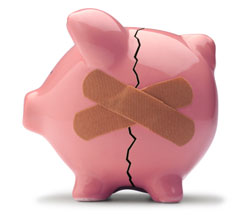 There is nothing easy about living with bad credit. It becomes harder to buy a home, rent an apartment and purchase a car. You may pay a higher insurance premium, and in some cases, bad credit can stop certain employment opportunities.
There is nothing easy about living with bad credit. It becomes harder to buy a home, rent an apartment and purchase a car. You may pay a higher insurance premium, and in some cases, bad credit can stop certain employment opportunities.
While you can’t undo past mistakes, you can start over and give your credit an overhaul. Don’t think of bad credit as a permanent cloud hanging over your head. Credit scores are based on credit habits, and if you change your thinking and the way you manage credit, you can repair your credit.
Here are four quick fixes for your credit.
Check your credit report.
Ignoring your credit profile is a recipe for trouble. These reports include details about your credit past, from your first account to your most recent accounts. They reveal your payment history, balances, paid off accounts, inquiries, previous addresses and other account information. A review of your report is how future creditors determine creditworthiness. But unfortunately, reports aren’t always accurate.
It only takes one major inaccuracy to drive down your credit score. Another person’s negative information may show on your report, or creditors may report a paid balance as delinquent. Order your report from Annualcreditreport.com. Check the report and notify creditors of mistakes.
Set up payment reminders.
Never miss a loan or credit card payment. Even with a good payment record in the past, skipping one or two payments can hurt your credit score. Sign up for online account management to stay on track. You can also set up payment reminders on your computer or smartphone. Additionally, don’t wait until the last minute to mail a check. Allow at least five to seven days for your payment to reach creditors. Because your payment history makes up 35% of your credit score, alert creditors to financial problems that prevent timely payments. In this case, you may qualify for a deferment or extension.
Reduce how much you owe.
Don’t rely on credit cards for everyday purchases. High credit card balances not only increase your debt load, they also lower your credit score. The amount you owe to creditors make up 30% of your credit score. If you’re looking to repair your credit, paying down debt is a good start. Start by limiting how often you use your credit cards. Pay more than your minimum each month, and look for ways to reduces everyday expenses. The money you save by eating out and shopping less can go toward paying down debt.
Stop applying for new accounts.
Everyone loves a deal and being able to save 10% on your purchase may sound appealing. But if you complete too many credit applications, your credit score will suffer. Repairing your credit isn’t only about timeliness and paying down debt. Reducing your number of credit inquires or applications plays a major role in credit improvement. Every application can reduce your score by two to four points. One credit application isn’t the kiss of death. But if you complete 10 applications in a short time span, you might reduce your score by 20 points.
